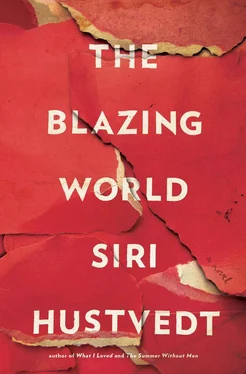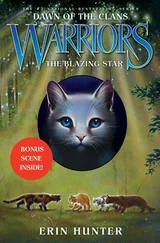Because Rune was older, he felt responsible for Mom and, although he didn’t show it, I think it made him angry underneath. He used to snitch things and hide them in his room: a couple of dollars from Mom’s purse or a new box of potato chips or cookies from the cupboard. I suspect he nabbed things from stores just for the thrill of it. He had key rings and flashlights and doodads you see hanging near the cash register at the grocery store in his “stash.” He needed to hide things, and he needed to have secrets. Rune invented a special code for the two of us. It wasn’t too complicated. For each letter in a word, we’d count two letters that came after it, and we’d have a secret message. We left Y and Z the way they were, so sometimes I’d come home after my clarinet lesson and see a note on the table: OQO KU UKEM. “Mom is sick.” We got good at that one. Not long before he died, Rune called me MKTUVGP on the phone, pronounced Mik-tuvga-pa. That’s how Kirsten came out. He hadn’t called me that for years. We had to put in vowels just to pronounce those crazy words, but you get the idea.
Rune used to tell me he remembered when our parents got along. All I could remember was fighting, not physical fighting, but yelling, crying, and door-slamming, or silence — the two of them hardly talking at all, ships in the night. I’d climb into bed beside my brother and ask him to tell me about “before,” and Rune would put me to sleep by telling me that Dad used to come home with big bunches of flowers and valentines on Valentine’s Day for Mom, and back in those days, he said, Mom didn’t drink at all. He said they danced together in the living room like a couple of lovebirds, smooching and hugging. When I got older, I realized he was making it all up, but my point is that he was making it up for me. Case makes fun of my job in the book, too. It’s unbelievable. Everything’s a joke to that guy. He writes that my work probably influenced Rune’s art, but he says nothing about the accident.
Hess: The accident?
Smith: The accident when I was eleven. I was on my way to ballet class with three of my friends. Jessica’s mother was driving, and I was in the passenger seat because that day the girls decided I smelled bad. Honestly, girls can be so stupid and mean. I pretended I was too good for them. They all hopped into the back, said there was no room for me, and I ended up in the front seat, which is a highly important detail because a few minutes later a car sped through the light at an intersection and smashed into the side of the car where I was sitting. The last thing I remember was the sight of the dirty gray bottoms of my ballet slippers lying in my lap. When I woke up, I was in the hospital with cracked ribs, torn ligaments in my back, a dislocated shoulder, a broken jaw, and a sliced-up face. I could easily have died, so everyone said I was lucky. They sewed my face together, but I had to have six plastic surgeries over the years to repair the keloids and scar tissue.
You know, what’s funny is that right after the accident, things were better, in the family, I mean. Mom stayed with me, and she seemed pretty sober, and after Dad left work he came straight to the hospital. He didn’t talk much, and my jaw was wired shut so I couldn’t say a word to him. Even nodding hurt me in the beginning, but he held my hand and he’d tighten his grip and loosen it and then tighten it again, and he smiled at me with a pitiful look on his face. Rune made me little houses from Popsicle sticks, which I liked, and Jessica, Gina, and Ellen, who had walked out of the smashed car without a scratch, were so guilty they brought me cards and flowers, and that felt good.
The doctors did a great job on me, and as you can see, I only have a few minor souvenirs, but it was hard losing my old face. When Mom first saw me, she sobbed and sobbed. I’m sure she thought my life was over. I mean, what was a girl going to do with a face like that? I became a craniofacial technician because I understand what it means to lose your face, to look different and have to live with distorted features. It is extremely interesting work, and believe me, there are people much worse off than I ever was, and whatever I can do to help restore a person’s identity is positive. I don’t think that’s so comical, do you? When Rune made The Banality of Glamour , I know he was thinking about me in the hospital. He was thinking about my surgeries and how tough they were. That work was personal, you see. In the book, Case makes it seem as if nothing Rune did was personal. He makes him into a robot, not a person, but that was not my brother at all. His problems, and he certainly had them, were personal. And now that I’m on a roll, I want to say Dad did not drown those kittens.
Hess: But kittens drowned?
Smith: It happened before the accident. When I was seven and Rune was eleven, we sneaked a stray cat into the house, Joe, who turned into Josephine when she gave birth to a litter in our hamper. We were not allowed to have pets, and we were scared Dad would find out. It didn’t happen often, but every once in a while Dad blew his top, and when that happened we’d both run like the wind because you didn’t want to be in his way. He didn’t hit us, but he threw things. Mom and Dad were both out, and that’s when Rune grabbed the six pink, blind kittens and drowned them in a big bucket in the garage while I scratched, kicked, pounded on him, and screamed bloody murder. They died right away. Rune stood there looking down at them with a sad and surprised look on his face. I don’t think he knew himself why he had done it. I buried them in the dirt under the holly bush in the backyard.
I should mention that there were people in Clinton and on the farms around town who drowned kittens routinely. I thought and still think it’s inhumane, but animal rights wasn’t such a big concern then as it is today. I didn’t speak to my brother for two days, but then he came crying to me because he felt so bad, and I forgave him. And Case was right about one part of the story. Rune took good care of Josephine after that. She never became a house cat. She was a roamer, but Rune had her spayed and fed her every time she came around for food.
Hess: Are you saying that Rune regretted what he had done?
Smith: Yes, he seemed really sorry, and I think he was. Rune played perfect, if you know what I mean, the model citizen, the all-around nice American boy, but it was partly an act, a put-on. I used to see it happening when he talked to Mom and Dad or other grown-ups. He’d get this special hidden look on his face, a disguise, really. With his friends he was different, tougher and cooler, but was that really him? I don’t think so. It was lonely for him. That’s why he needed me. If you hide yourself too much, you get isolated and sad. We had fun together, even during the really bad time after my accident and Mom was sick, and Dad was pretty much useless except for going to work and coming home. Rune used to help me with my makeup to cover up some of the scarring, but he’d do my eyes and mouth, too. The artist in him was hard at work with sponges and brushes, and he’d say, “Look at you, glamour girl.” He’d be really proud, and sometimes he’d turn me into a witch, and we’d laugh so hard we had to lie down on the bathroom floor and hold our stomachs.
Mom passed only a year later. I had turned twelve and Rune was sixteen. Rune and I were home. We’d been in the house for an hour, but I peeked in the door and I thought Mom was sleeping. When Dad came home, he went in to get her up and then he saw that she wasn’t breathing. It was pretty bad for all of us. After she was gone, we felt lost. We had all spent so much time worrying about her and taking care of her and loving her and hating her, we didn’t know how to organize ourselves anymore, how to be together. Before Rune left home, he had black moods, days when he’d go into his room and stay there, lying on his bed with a towel over his face. Once he broke the mirror with a baseball bat. Dad and I heard the crash, we ran into Rune’s room, and he was just standing there, grinning. I helped him clean it up. Dad turned around, walked out, and never said a word about it.
Читать дальше












